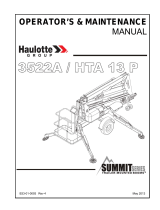
FORCE
®
TROLLING MOTOR
LATCH RETENTION KIT
INSTALLATION
INSTRUCTIONS
Getting Started
WARNING
Always disconnect the trolling motor from the battery before
performing any service.
Do not run the motor when the propeller is out of the water.
Contact with the rotating propeller may result in severe injury.
CAUTION
When stowing or deploying the motor, be aware of the risk of
entrapment or pinching from moving parts, which can result in
injury.
You should read these instructions completely before beginning
this service, and make sure that you have the tools and skill set
needed to complete it. If necessary, you should use a qualified
marine installer to ensure proper service.
To aid with the installation, you can view a video of this process
at www.garmin.com/videos/trolling_motor_latch_kit.
Tools Needed
• #1 Phillips screwdriver
• #2 Phillips screwdriver
• Needle-nose pliers
• 4 mm hex bit or wrench
• Approximately 60 cm (2 ft.) length of rigid plastic tubing, pipe,
or PVC with an inner diameter of approximately 25 mm (1 in.)
• The cardboard box containing the parts for this kit
Replacing the Locking Mechanism
The first part of installing this latch kit is to replace the latch bar
and spring in the locking mechanism with the new parts
provided in this kit.
CAUTION
Use extreme care when working on the trolling motor when
supporting it in the partially-stowed position. A falling motor may
crush or pinch hands and fingers.
1
Transition the trolling motor to a partially-stowed position and
place a piece of rigid plastic tubing, pipe, or PVC over the
stabilizer rod to add additional support and prevent the
latching mechanism from engaging and locking the motor in
the stowed position.
NOTE:
If you did not install the stabilizer on your trolling
motor, you should support the motor on a sturdy object to
prevent it from locking in the stowed position.
2
Disconnect the lower gas spring (Disconnecting the Lower
Gas Spring, page 1).
3
Remove the existing spring and lower latch bar (Removing
the Existing Latch Bar, page 1).
4
Install the new latch bar and spring (Installing the New Latch
Bar, page 2).
5
Reconnect the lower gas spring (Reconnecting the Lower
Gas Spring, page 2).
Disconnecting the Lower Gas Spring
1
Using a #2 Phillips screwdriver, remove the screws that
secure the lower gas spring clevis to the lower link of the
mount.
2
Lift the lower gas spring clevis off of the safety rod .
Removing the Existing Latch Bar
1
Using a pair of needle-nose pliers, disconnect the latch
spring from the s-hook on the mount base.
2
Using the access hole in the lower link , remove the spring
from the end of the rod in the latching mechanism .
GUID-FB6B2714-F3D1-4F6C-9CA0-59C3B6F6A93F v1July 2020





